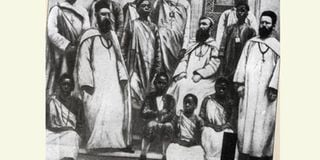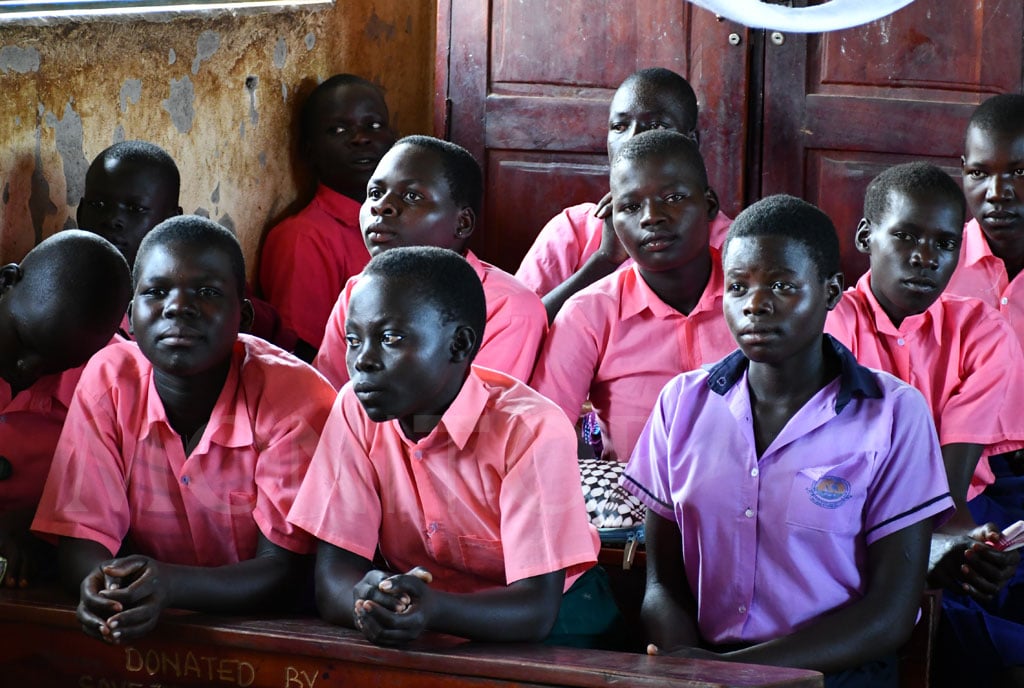Prime
Bibles turn into bullets in Buganda

Leon Livinhac (seated with cap) a Catholic Missionary, poses for a photo with some Ugandan Christian converts. Courtesy photo.
What you need to know:
Christians unite to drive out Muslims and reinstate Mwanga but the Kabaka grabs colonialism from the jaws of sovereignty by inviting more imperialists to Buganda.
Kampala
The religious wars that broke out in Buganda at the end of the 1880s were to some extent inevitable and the marriage of convenience between the Muslims and the Christians would last for only a few weeks.
The immediate problem was that although the Muslims were the more powerful faction in the ouster of Kabaka Mwanga, the Christians took over the top chiefly positions in the Kingdom under Nyonyitono Kiweewa.
In October 1888, the Muslims attacked the Christians, murdering dozens and forcing hundreds more to flee to Ankole. The European missionaries, both French and English, were arrested and forced to leave the kingdom via Lake Nalubaale.
It meant that by the end of 1888, having installed their pawn Rashid Kalema Muguluma as Kabaka, the Muslim faction of Buganda chiefs and their Arab backers were the dominant power in Buganda.
Muslims take charge
If the Muslims had maintained their grip on power, the history of Uganda would have been different. There is a passing possibility that the country – or at least parts of it – would have become Muslim and could probably have been more receptive to the imperial adventures from the Egyptians up north.
The Muslim faction received less hostility from the chiefs who practiced traditional religious beliefs in part because Islam looked more favourably upon polygamy and often looked the other way in regard to the use of fetishes.
Having converted Kalema to their religion, the Muslims sought to secure their position. In July 1889 they had the deposed Kabaka Rashid Kiweewa, who was in custody, killed by setting on fire the house in which he was being held prisoner.
Then, fearing that the missionaries could engineer an ascension to the throne by one of the princesses (wasn’t England, after all, governed by Queen Victoria?), they turned on many of the royal ladies and had them killed or forced them to flee.
But the Muslims had failed to uproot the tree stump of Buganda royalty that was Mwanga and had underestimated his bouncebackability.
In the first half of 1889, Mwanga, who had by this time made it by canoe to the safety of the Catholic mission in Bukoba, present-day Tanzania, reached out to the European missionaries who had been forced by the marauding Muslim victors to flee to south of the lake. Mwanga promised to allow the right to worship if the missionaries helped him win back his kingdom.
The missionaries and their converts, who had fled to Ankole could raise an army that could help Mwanga fight back to reclaim his kingdom.
Mwanga needed men to fight on his behalf. The Christians needed a Muganda royal to lead their effort to reclaim their place in Buganda society (a combination of war, bubonic plague, palace blood-letting and venereal disease had combined to ensure that there weren’t very many willing or able royals to give credible leadership to such an effort).
Mwanga’s first attempt to wrest back power ended in defeat on the shores of Lake Nalubaale, his lucky escape, and the dispersal of his forces by the better armed Muslim forces.
However, Mwanga and the Christians then got a lucky break. Charlie Stokes, a Church Mission Society missionary, who had turned into an arms dealer in the region, intercepted a consignment of arms intended for the Muslims in Buganda and had instead sold them to the Christian faction.
Mwanga’s faction was successful at the second time of asking, routing the Muslims, taking the capital of the kingdom and reinstating Mwanga as Kabaka.
Although Mwanga was king, his authority was not supreme. He clearly owed his return to power to the support and arms of the missionaries and their Christian converts and it showed; not only did the Christian missionaries influence the giving out of kingdom posts and chiefdoms to chiefs who professed their faith, Mwanga himself now professed to be a Roman Catholic and was under the considerable influence of Father Simeon Lourdel.
The political landscape in Buganda had changed irreversibly. In the six years since Mutesa I’s death in 1884, the Kingdom had witnessed five changes of the king and all of them as a direct result of external, foreign influence. Having eliminated their common foe, it was only a matter of time before these foreign influences sought to dominate the new state of political affairs.
There had been an intense rivalry between the Protestant Mackay and the Catholic Lourdel driven in large part by the former’s deep dislike of Catholicism.
With the missionaries having turned king makers and with European imperial interest in Africa having been declared openly in Berlin in 1884, that rivalry now became political.
The two camps began to openly identify themselves on the basis of the countries from which their missionaries came. Thus the Catholics became only pro-France while the Protestants openly showed support for England.
Although the conflict between the two camps is widely considered to have been religious, texts from the time suggest that it was mainly political, as chiefs and other converts jostled to belong to the king’s camp – at that point the Catholic camp – to benefit from royal patronage, especially land offers.
Mwanga was about to commit one final strategic blunder – one that would lead to the final nail in the coffin of his reign and in the fortunes of his kingdom.
To try and shore up his support and consolidate his position against the Muslims, Mwanga sent a delegation of his chiefs to the coast and invited representatives of the Imperial British East Africa Company, which had been granted a royal charter over the territory that would become Uganda, to come and help him govern.
In inviting the white man to his kingdom 15 years earlier, Mwanga’s father had opened his kingdom up to foreign influence. Unwittingly, his son was now handing it over to foreign control on a silver platter. The sun was setting on half a millennium of Buganda’s glory but there would be plenty of blood and drama before darkness set in fully.




